Gather round, berry enthusiasts! Today, I’m diving into the delightful world of blackberries and raspberries. These two berries may appear similar, but they each bring their own unique qualities to the table. Let’s compare and contrast the blackberry and raspberry, exploring their nutritional benefits, taste profiles, sizes, seasonal availability, and more.
Key Takeaways:
- Blackberries and raspberries have distinct characteristics, even though they may look somewhat similar.
- Blackberries are larger, with a tart flavor, while raspberries are sweeter and more delicate.
- Both berries offer an array of vitamins, minerals, antioxidants, and health benefits.
- Blackberries and raspberries are versatile in the kitchen, perfect for pies, sauces, desserts, and more.
- Enjoy these delicious fruits when they are in season for the freshest and most flavorful experience.
Nutritional Comparison
When comparing the nutritional profiles of blackberries and raspberries, both fruits offer a range of vitamins, minerals, and health benefits. Let’s take a closer look at the nutritional facts:
Blackberry Nutrition Facts
Blackberries are a nutrient-rich fruit that can boost your overall health. Here are the key nutrition facts for blackberries:
- Calories: 62
- Carbohydrates: 14g
- Vitamin C: Provides a good amount, which is essential for immune function and helps in collagen production.
- Vitamin K: Contains a significant amount that aids in blood clotting and contributes to bone health.
- Antioxidants: Blackberries are packed with antioxidants, such as anthocyanins, which help protect against oxidative stress and inflammation.
Raspberry Nutrition Facts
Raspberries are known for their vibrant color and sweet taste, but they also offer a host of health benefits. Here’s a breakdown of raspberry’s nutritional content:
- Calories: 64
- Carbohydrates: 15g
- Fiber: Raspberries are high in fiber, promoting digestive health and aiding in weight management.
- Vitamin C: Provides a good amount of this immune-boosting vitamin, essential for collagen production.
- Vitamin K: Contains an ample amount that contributes to bone health and blood clotting.
- Antioxidants: Raspberries are rich in antioxidants, helping to protect against free radicals and reduce inflammation.
Both blackberries and raspberries are nutritional powerhouses, offering an array of vitamins, minerals, and antioxidants. Including these berries in your diet can provide numerous health benefits and contribute to a well-rounded and nutritious eating plan.
Size and Appearance
When comparing blackberries and raspberries, one noticeable difference lies in their size and appearance. Blackberries are generally larger than raspberries, boasting a more substantial presence. The size discrepancy can be attributed to their higher anthocyanin content, which contributes to their darker color as well.
Blackberries, with their rich anthocyanin concentration, exhibit a deep, almost black hue. They also have a smooth texture and a distinctive white or green center. On the other hand, black raspberries are comparatively smaller and duller in appearance. They resemble raspberries in terms of their hollow center but come in various shades ranging from deep purple to black.
Nutrition Facts
| Blackberry | Raspberry | |
|---|---|---|
| Calories per serving | 62 | 64 |
| Carbohydrates per serving | 14g | 15g |
Before diving into the distinctive qualities of each berry, it’s worth examining their nutritional composition. One serving of blackberries provides 62 calories and 14 grams of carbohydrates. Raspberries, on the other hand, deliver 64 calories and 15 grams of carbohydrates per serving.
Both blackberries and raspberries offer an array of vitamins, minerals, and antioxidants. These fruits contribute to a healthy diet and can be enjoyed in various culinary creations.
Taste Comparison
When it comes to the taste of blackberries and raspberries, there are distinct differences that make each fruit unique. Blackberries are known for their tartness, while raspberries have a brighter and more refreshing flavor with a delicate sweetness. The preference between blackberries and raspberries ultimately comes down to personal taste.
“The tartness of blackberries adds a bold, tangy kick to dishes, making them a popular choice for pies, jams, and sauces,” says Chef Jane Thompson. “On the other hand, raspberries have a delicate sweetness that pairs well with desserts like cakes and tarts.”
The level of tartness in blackberries can vary depending on their ripeness. Ripe blackberries tend to be sweeter and less tart compared to unripe ones. Raspberries, on the other hand, consistently offer a pleasant balance of sweetness and acidity.
Whether you prefer the tartness of blackberries or the refreshing sweetness of raspberries, both fruits provide a burst of flavor that can elevate various culinary creations.
Pairing Ideas
If you’re looking to enhance the flavor of blackberries, consider pairing them with creamy ingredients like yogurt or cheesecake. The tartness of blackberries can complement the richness of these dairy-based foods, creating a delightful contrast. For raspberries, their delicate sweetness pairs well with chocolate, lemon, or mint flavors, adding a refreshing twist to desserts and beverages.
Tasting Notes
During a blind taste test conducted by the Berry Association, participants described blackberries as tangy and slightly acidic, with some notes of sweetness. Raspberries were described as bright and juicy, with a taste reminiscent of summer and a delightful sweetness.
| Blackberries | Raspberries |
|---|---|
| Tart | Bright and refreshing |
| Slightly acidic | Delicate sweetness |
| Versatile for both sweet and savory dishes | Perfect for desserts and beverages |
Both blackberries and raspberries have their own unique flavor profiles, allowing you to explore different taste experiences. Whether you’re a fan of tartness or prefer a sweeter touch, blackberries and raspberries offer a range of possibilities for various culinary creations.
Culinary Uses
When it comes to culinary creativity, both blackberries and raspberries offer endless possibilities in the kitchen. From sweet to savory, these versatile berries can be used in a variety of dishes to add flavor, color, and a touch of natural sweetness.
Blackberry Recipes
Blackberries are a popular choice for creating delectable desserts and sauces. Their tartness adds a unique twist to pies, cobblers, and crumbles. To enhance the flavor of blackberries, they can be paired with complementary ingredients such as cinnamon or lemon zest.
Here are some delicious blackberry recipes to try:
- Blackberry Pie
- Blackberry Jam
- Blackberry Sauce for Pancakes
- Blackberry Smoothie
Raspberry Recipes
Raspberries, with their delicate sweetness, are perfect for creating luscious desserts. They can be used to make irresistible cakes, tarts, and sorbets. Raspberries also pair well with chocolate or creamy ingredients like mascarpone cheese.
Here are some delightful raspberry recipes to explore:
- Raspberry Cheesecake
- Raspberry Tart
- Raspberry Sorbet
- Raspberry Yogurt Parfait
In addition to desserts, both blackberries and raspberries can be incorporated into savory dishes to add a burst of vibrant flavor. They can be used in salads, vinaigrettes, and marinades, creating a delightful contrast of sweet and tangy notes.
For a healthy and refreshing twist, try adding blackberries or raspberries as a topping for yogurt, oatmeal, or even savory dishes like grilled chicken or roasted vegetables.
Get creative and experiment with these delightful berries in your favorite recipes. Whether you’re craving a sweet treat or looking to elevate a savory dish, blackberries and raspberries offer a world of culinary possibilities.
Now, let’s take a look at the nutritional profiles of these berries in the next section.
| Blackberries | Raspberries |
|---|---|
| Calories: 62 | Calories: 64 |
| Carbohydrates: 14g | Carbohydrates: 15g |
| Vitamin C: 30% of the Daily Value | Vitamin C: 36% of the Daily Value |
| Vitamin K: 29% of the Daily Value | Vitamin K: 24% of the Daily Value |
| Fiber: 8g | Fiber: 8g |
Seasonal Availability
When it comes to enjoying the fresh flavors of blackberries and raspberries, knowing their seasonal availability is key. Blackberries are typically in season from late spring to early fall, with peak availability in the summer months. This means that during this time, you can expect to find an abundance of plump and juicy blackberries at your local farmers’ markets and grocery stores.
Raspberries, on the other hand, have a shorter season that usually begins in late spring and lasts through early summer. These delicate berries are highly sought after for their unique sweetness and vibrant color. During their limited season, raspberries are at their freshest and most flavorful, making it the perfect time to indulge in their deliciousness.
Both blackberries and raspberries have their own distinct periods of availability, so it’s best to enjoy them while they are in season. Whether you prefer the tartness of blackberries or the sweetness of raspberries, these seasonal fruits are sure to delight your taste buds.
Seasonal Availability of Blackberries and Raspberries
| Blackberries | Raspberries |
|---|---|
| Late spring to early fall | Late spring to early summer |
Health Benefits Comparison
Blackberries and raspberries offer a range of health benefits, making them valuable additions to a balanced diet.
Blackberries are packed with antioxidants, which have been shown to reduce inflammation and protect against chronic diseases. These antioxidants help neutralize harmful free radicals in the body, promoting overall health and wellbeing. Furthermore, blackberries are an excellent source of dietary fiber, aiding in digestion and weight management.
Raspberries also provide similar health benefits. They are known for their heart-healthy properties, thanks to their high levels of antioxidants and polyphenols. These compounds help reduce the risk of heart disease and lower cholesterol levels. Raspberries are also rich in vitamin C, which supports immune function and boosts collagen production for healthy skin. Additionally, they contain minerals like manganese, promoting strong bones and reducing the risk of osteoporosis.
Comparison of Health Benefits:
| Health Benefits | Blackberries | Raspberries |
|---|---|---|
| Antioxidant-rich | Yes | Yes |
| Digestive Health | Yes | No |
| Weight Management | Yes | No |
| Heart Health | No | Yes |
| Immune Support | No | Yes |
| Strong Bones | No | Yes |
As seen in the table above, blackberries and raspberries offer distinct health benefits. While blackberries shine in terms of antioxidants, digestive health, and weight management, raspberries excel in promoting heart health, immune support, and strong bones. Incorporating both fruits into your diet allows you to reap the diverse range of health benefits they provide.
Distinctions and Misconceptions
When it comes to blackberries and black raspberries, there are important distinctions to be aware of to clear up any misconceptions. Although they share similar names, these two fruits have their own unique qualities and characteristics that set them apart.
Blackberry Facts
Blackberries, with their larger size and smoother texture, are often mistaken for black raspberries. These berries contain a higher anthocyanin content, giving them a deep, dark color. Blackberries are known for their tartness and are popularly used in pies and sauces.
Raspberry Facts
Raspberries, on the other hand, are smaller and have a more delicate nature. They are sweeter in taste compared to blackberries and are commonly used in sauces and desserts. Raspberries come in a range of colors, from red to pink to black, and are easily recognized by their hollow center.
Blackberry vs Black Raspberry
One common misconception is confusing black raspberries with blackberries. While they may look similar, black raspberries have their unique sweetness and a shorter growing season compared to blackberries. It’s important to note that black raspberries are not simply black-colored raspberries, but a distinct fruit in its own right.
By understanding these distinctions, we can appreciate the unique qualities of blackberries and black raspberries without any misconceptions.
| Blackberries | Black Raspberries | |
|---|---|---|
| Taste | Tart | Sweet |
| Size | Larger | Smaller |
| Color | Dark | Varies (purple to black) |
| Growing Season | Longer | Shorter |
Being aware of these differences allows us to appreciate and enjoy each berry for what it is, and make informed choices in our culinary endeavors.
Mulberry vs Blackberry Comparison
When it comes to comparing mulberries and blackberries, these two fruits have distinctive nutritional profiles and unique health benefits.
Mulberries are a good source of vitamin C, iron, and dietary fiber. They also contain resveratrol, a powerful antioxidant known for its potential health benefits.
On the other hand, blackberries are high in vitamin C, vitamin K, and manganese. These nutrients are essential for maintaining overall health and wellbeing.
Let’s take a closer look at the specific nutritional information for both fruits:
| Mulberries | Blackberries | |
|---|---|---|
| Vitamin C | 31.2 mg (52% DV) | 21 mg (35% DV) |
| Iron | 1.85 mg (10% DV) | 0.9 mg (5% DV) |
| Dietary Fiber | 1.7 g (7% DV) | 7.6 g (30% DV) |
As shown in the table, mulberries are particularly rich in vitamin C and iron, while blackberries offer more dietary fiber.
Include both mulberries and blackberries in your diet to enjoy their unique nutritional benefits and support your overall health.
Conclusion
In the showdown between blackberry fruit and raspberry, it’s clear that both fruits have their own unique qualities and health benefits. Blackberries are larger, more tart, and darker in color, while raspberries are sweeter and more delicate. But despite these differences, both fruits offer a range of vitamins, minerals, and antioxidants that can contribute to a nutritious and flavorful eating experience.
When deciding between blackberry and raspberry, it ultimately comes down to personal taste and preference. Some may prefer the bold and tangy flavor of blackberries, while others may gravitate towards the sweet and refreshing taste of raspberries. Regardless of which fruit you choose, incorporating these berries into your diet can be a delicious way to boost your intake of essential nutrients.
Whether you enjoy them fresh, add them to your favorite recipes, or use them as a topping for yogurt or oatmeal, blackberries and raspberries are a fantastic addition to a balanced diet. So the next time you’re looking for a healthy and tasty treat, why not give these berries a try? You won’t be disappointed!
FAQ
Are blackberries and raspberries true berries?
No, blackberries and raspberries are not true berries. They are composed of drupelets.
What is the nutritional difference between blackberries and raspberries?
Blackberries have 62 calories and 14g of carbohydrates per serving, while raspberries have 64 calories and 15g of carbohydrates per serving.
What health benefits do blackberries offer?
Blackberries are rich in vitamins C and K, antioxidants, and provide digestive health and potential weight management benefits.
What health benefits do raspberries offer?
Raspberries are high in fiber, vitamins C and K, and promote heart health, immune function, and strong bones.
How do blackberries and raspberries differ in size and appearance?
Blackberries are larger, smoother, and have a darker color due to their higher anthocyanin content. Raspberries are smaller, dull in appearance, and have a hollow center.
How do blackberries and raspberries compare in taste?
Blackberries are more tart, while raspberries have a brighter and more refreshing flavor profile with a delicate sweetness.
What are some culinary uses for blackberries and raspberries?
Blackberries are commonly used in pies, jams, sauces, and can be enjoyed fresh or added to salads and smoothies. Raspberries are often used in desserts, savory dishes, or as a topping for yogurt or oatmeal.
When are blackberries and raspberries in season?
Blackberries are typically in season from late spring to early fall, with peak availability in the summer months. Raspberries have a shorter season, usually from late spring to early summer.
What are the health benefits of blackberries and raspberries?
Blackberries offer antioxidants, potential anti-inflammatory properties, and contribute to digestive health and weight management. Raspberries promote heart health, immune function, and strong bones.
What are the distinctions and misconceptions between blackberries and raspberries?
Blackberries are different from black raspberries in their sweetness, growing season, and distinct characteristics. There can be misconceptions due to their similar appearance, but they have their own unique qualities.
How do mulberries and blackberries differ in terms of nutrition and health benefits?
Mulberries are rich in vitamin C, iron, dietary fiber, and contain resveratrol, a potent antioxidant. Blackberries are high in vitamin C, vitamin K, manganese, and have more fiber. Including both in a diet can contribute to overall health and wellbeing.
What can be concluded from the comparison of blackberry fruit and raspberry?
Both blackberries and raspberries have their own unique qualities, taste, and health benefits. The choice between them comes down to personal preference. Adding these berries to your diet can contribute to a nutritious and flavorful eating experience.

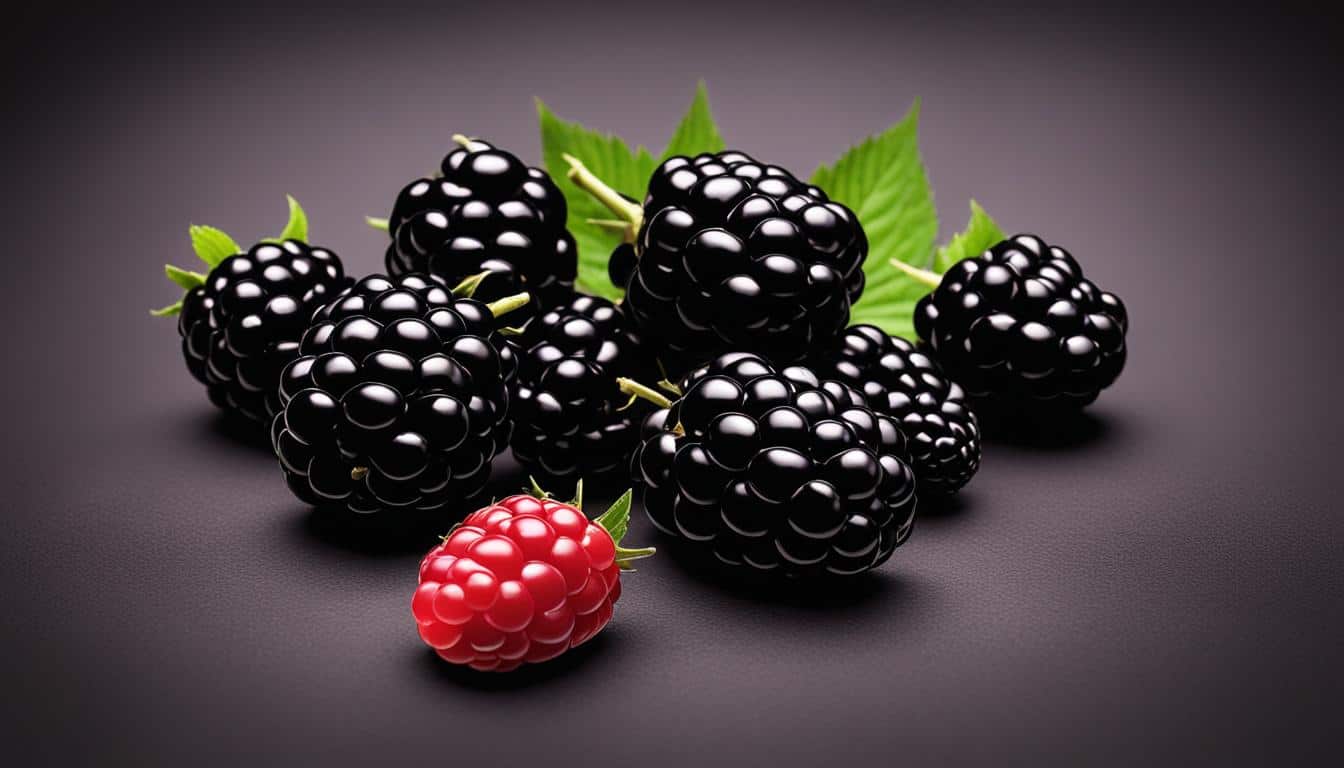
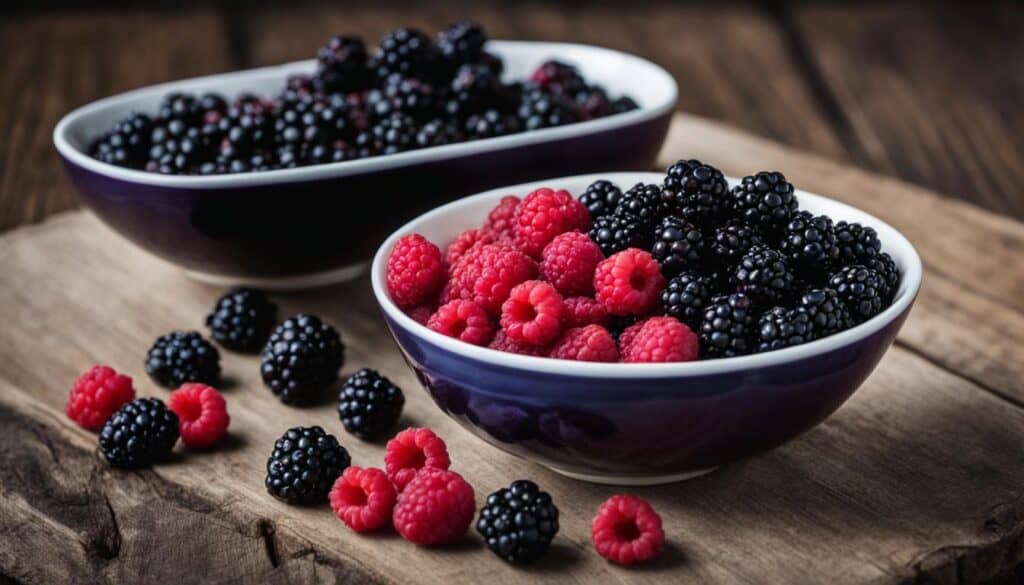
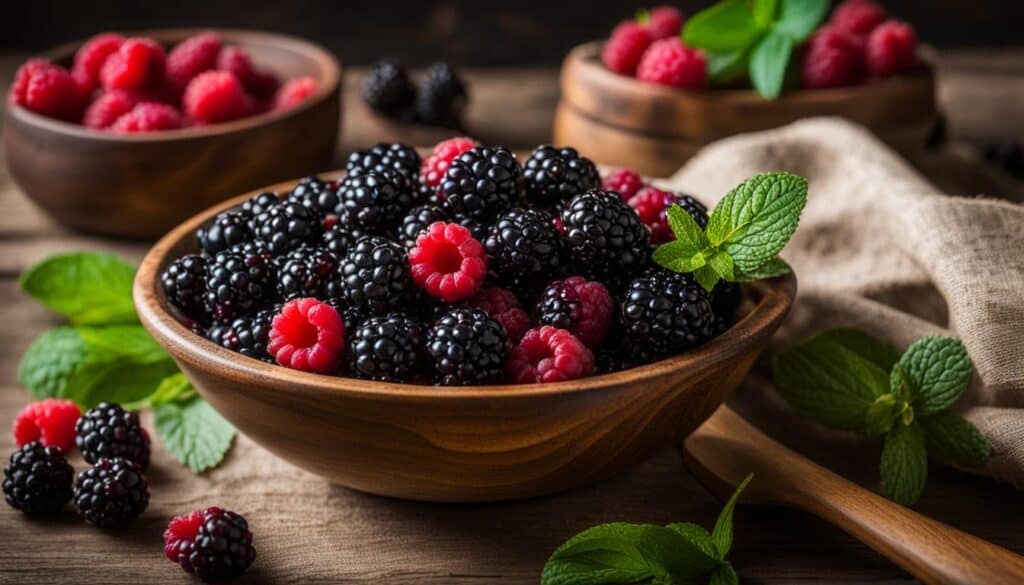
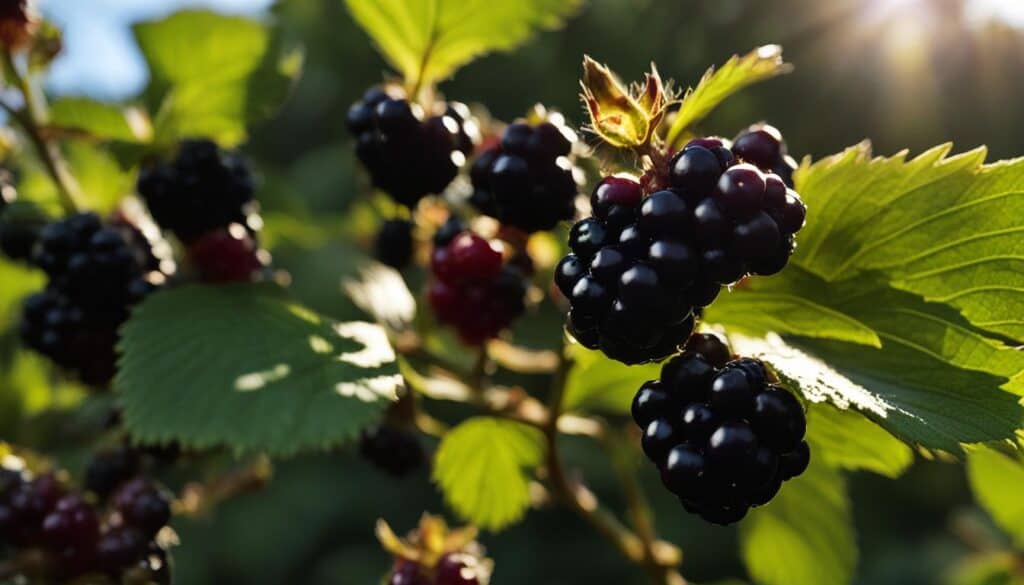
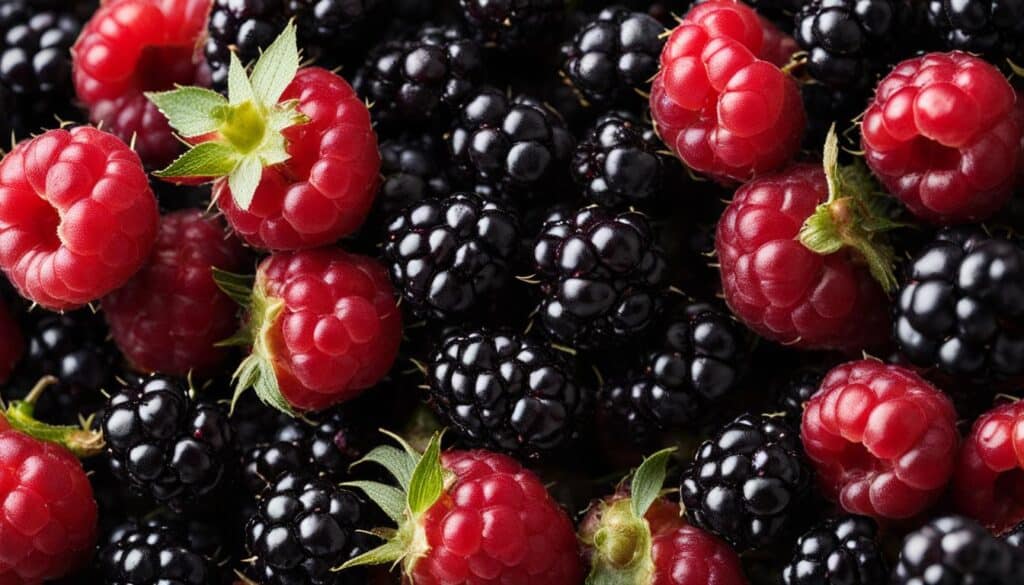
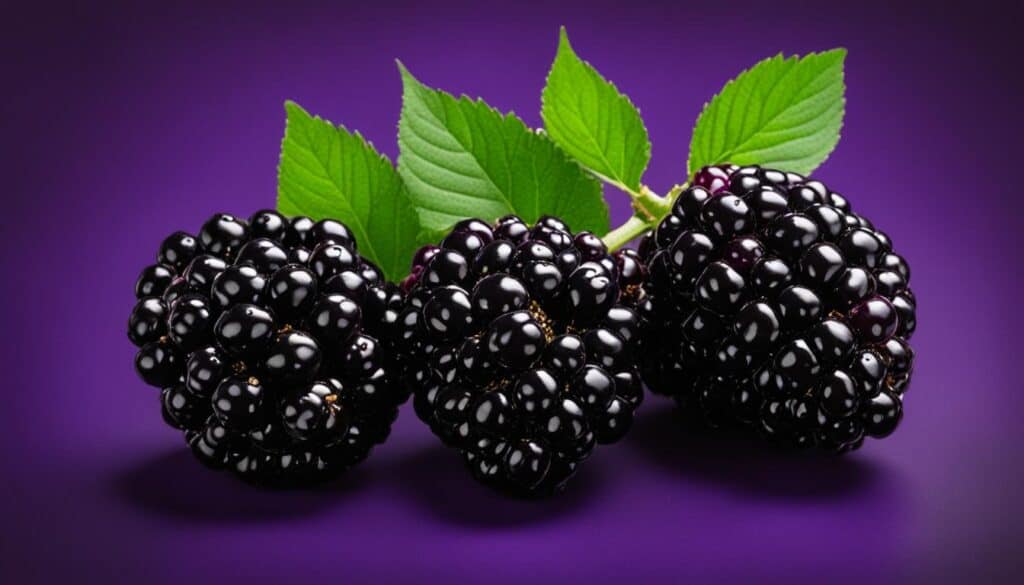



Leave a Reply